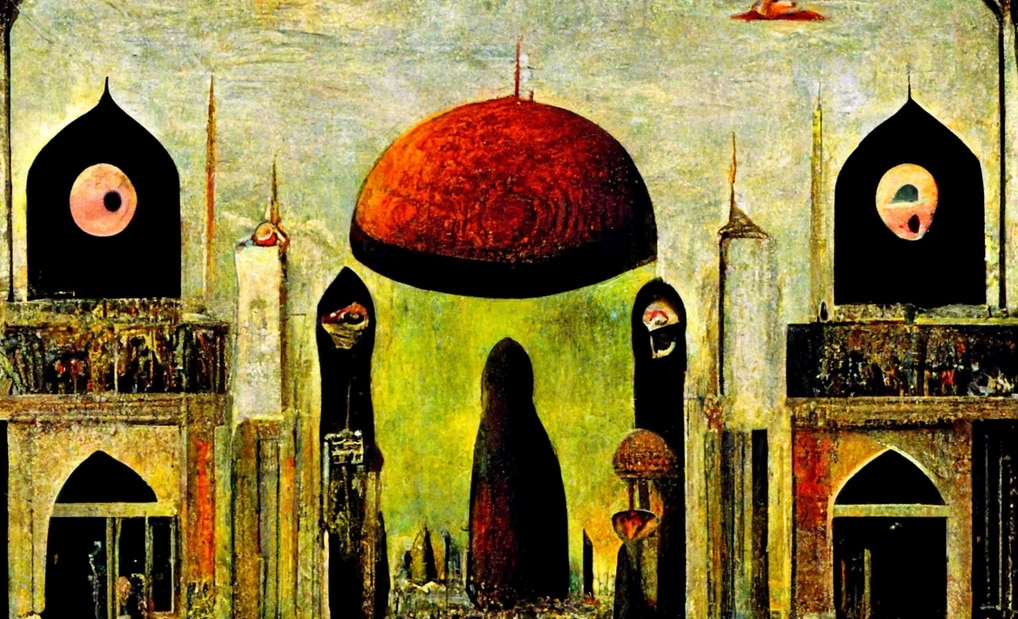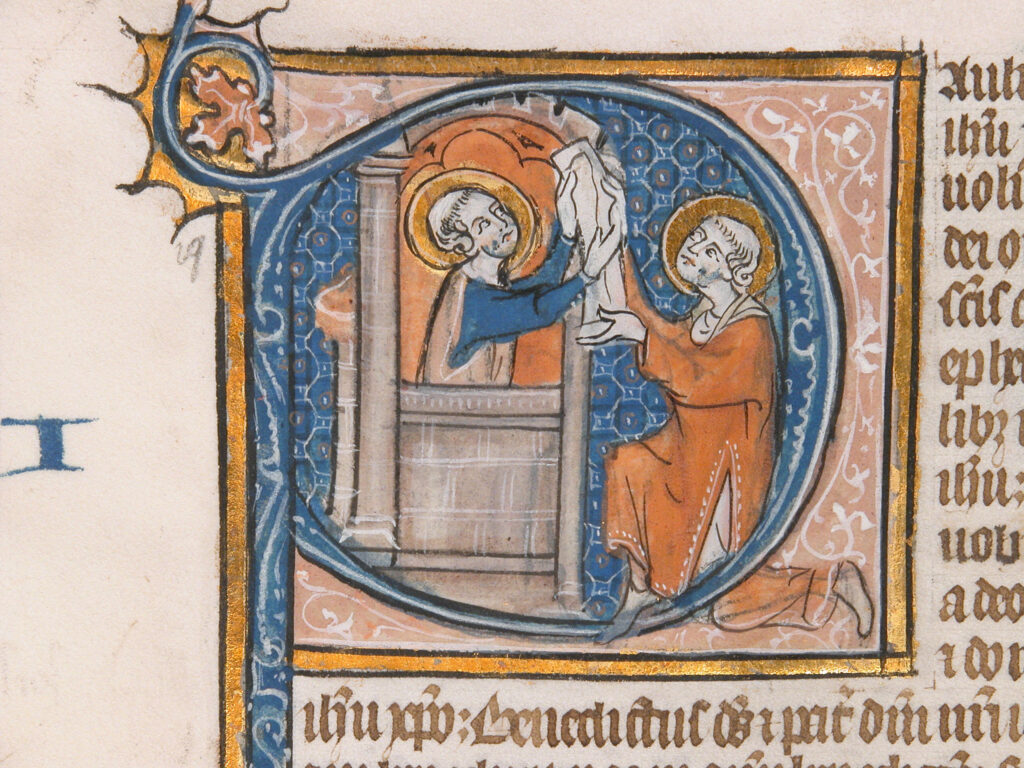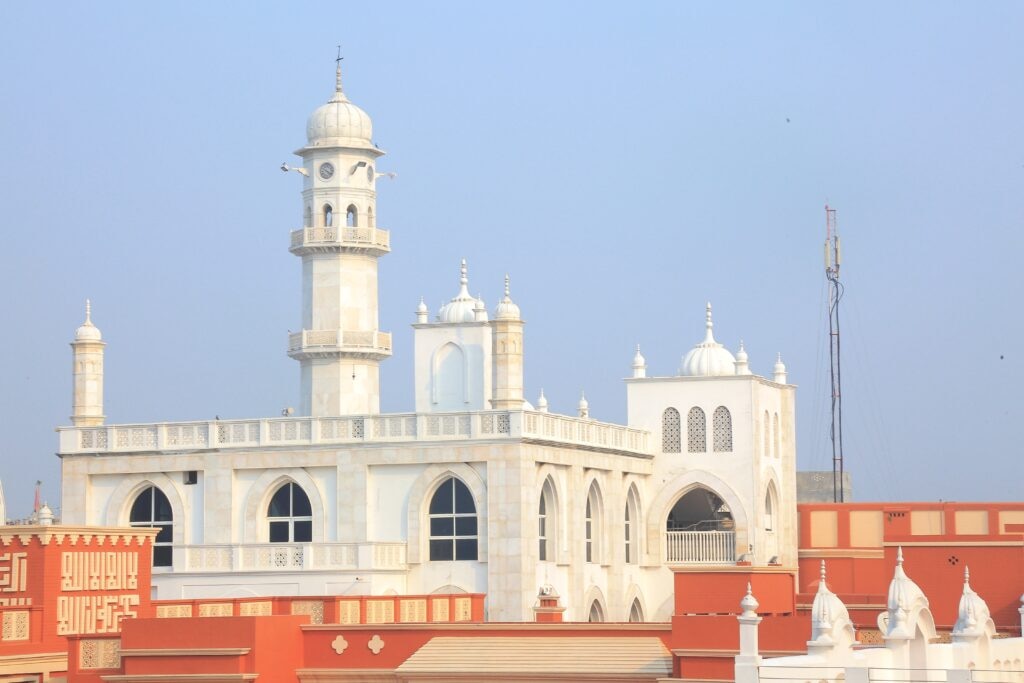Guidance regarding basic Islamic issues that Hazrat Amirul Momineen, Khalifatul Masih Vaa, has given on various occasions in his written correspondence and during MTA programmes is being published officially below for everyone’s benefit.

Pauline Trinity
A missionary from Kerala, India, wrote to Hazrat Amirul Momineen, Khalifatul Masih Vaa that the Promised Messiahas, had stated that “after the death of Jesusas of Nazareth, Paul initiated the concept of the Trinity.” However, according to Ahmadiyya beliefs, Prophet Jesusas lived for 120 years and Paul the Apostle died before that. The individual sought guidance on this matter. In his letter, dated 31 January 2022, Huzoor-e-Anwaraa provided the following answer to this question:
“In your correspondence, you made reference to a statement by the Promised Messiahas, which is taken from Huzoor’sas work, Chashma-e-Masihi. This publication was composed by Huzooras in response to a letter received from a Muslim individual in Bareilly, who had cited certain objections raised against Islam in Yanabi‘ul Islam, a book by a Christian author [i.e., The Original Sources of the Quran by W. St. Clair Tisdall, 1905]. In Chashma-e-Masihi, Huzooras provided a counter-response to the objections cited in that letter while drawing on the very beliefs of Christians and research conducted by non-Muslim scholars of Europe and America [on the subject]. Through this, he highlighted the reality of the corrupted teachings of Christianity. In this context, Huzooras also stated that, as per Judeo-Christian traditions:
“‘As long as Jesusas lived, Paul was his sworn enemy, and, according to Jewish chronicles, he only turned to Christianity after Jesus’ death because he had some selfish desires which the Jews did not fulfil. Therefore, in order to avenge himself, he became a Christian and pretended that Jesusas had appeared to him in a vision. He first sowed this unholy plant in Damascus, and this is the place where ‘Pauline Trinity’ was born.’ (Chashma-e-Masihi, Ruhani Khazain, Vol. 20, pp. 76-377)
“According to the words of Huzooras i.e., ‘according to Jewish chronicles’, it is evident that the death of Jesusas here refers to his death according to the Judeo-Christian traditions, according to which it happened when he was crucified. However, according to our belief, Allah saved His pious prophet from the cross to spare him from the cursed death described in the Bible [Deuteronomy 21:23]. Subsequently, he migrated to Kashmir in search of his remaining ten tribes, where he preached to his followers under the name ‘Prophet Yuz Asaf’. He passed away at the age of 120 and was laid to rest in Mohalla Khanyar, Kashmir, India, where his grave still exists. With regard to Paul’s case, while elucidating it, the Promised Messiahas writes in his other work, Kashti-e-Nuh:
“‘When the edict of disbelief was issued against Jesus, peace be upon him, Paul was also from the party that rejected him. Later, however, he promoted himself as an apostle of the Messiah. During the lifetime of the Messiah, this man was a strident opponent. Not one of the Gospels, which is attributed to the Messiah, prophesies that after him Paul will repent and become an apostle. There is little need to write about Paul’s character before his conversion, for the Christians are well acquainted with it. It is lamentable that for as long as the Messiah remained in his homeland, Paul caused him great grief. Yet after his deliverance from the cross, when the Messiah migrated to Kashmir, the same person entered himself amongst his disciples on the pretext of a fabricated dream, invented the doctrine of the Trinity, declared the flesh of swine to be lawful even though it was strictly forbidden in the Torah, and also made the consumption of wine a common practice. He entered the concept of the Trinity into the doctrine of the Gospel so that all these innovations would ingratiate the idol-worshippers of Greece.’ (Kashti-e-Nuh, Ruhani Khazain, Vol. 19, p. 65, footnote)
“Therefore, the specific reference to the death of Jesusas in the book Chashma-e-Masihi pertains to his death in accordance with Judeo-Christian traditions, according to which it occurred when he was crucified, not according to our belief.”

Jinn, ‘Ifrit, Promised Messiahas, Latter Days and taking oaths
Someone from Jordan sent the following questions to Hazrat Amirul Momineen, Khalifatul Masih Vaa:
Is everything out of sight a jinn and can Iblis and angels also be jinn?
Do Ahmadis believe in the existence of ‘ifrit?
We have read that the Promised Mahdi will appear in the Latter Days, are we really living in the Latter Days?
Can we take an oath in the name of Allah Almighty or the Holy Prophetsa or the Promised Messiahas?
Huzoor-e-Anwar, in his letter dated 10 February 2022, provided the following response to these queries:
1. Jinn
“In October 2021, I replied to your letter in which you asked about the jinn and the answer I sent also contains the answer to your first question. Please read it from there.”
(This answer by Huzooraa was published as the 46th instalment of “Answers to Everyday Issues” in Urdu in Al Fazl International on 23 December 2022, and in English in the Weekly Al Hakam on 30 December 2022. —ZK.)

2. ‘Ifrit
“As for the belief of the Ahmadiyya community about ‘ifrit, it is the same as what the Quran and Hadith have taught us. In Surah an-Naml, in the story of Hazrat Sulaimanas, Allah says:
قَالَ عِفۡرِيۡتٌ مِّنَ الۡجِنِّ اَنَا اٰتِيۡکَ بِہٖ قَبۡلَ اَنۡ تَقُوۡمَ مِنۡ مَّقَامِکَ ۚ وَ اِنِّيۡ عَلَيۡہِ لَقَوِيٌّ اَمِيۡنٌ
“‘A powerful chieftain (from among the people of the hills) said, ‘I will bring that (throne) to thee before thou strikest thy camp; and indeed, I possess power (therefor), (and) I am trustworthy.’’ (Surah an-Naml, Ch. 27: V. 40)
“The word ‘jinn’, as I explained in my previous letter, is used in many senses. This term is also used to describe a person who possesses fiery qualities and a spirit of rebellion, has a quick temper, and is prone to anger. Therefore, people who engage in fights, riots, rebellion, and defiance or stubbornness are also referred to as ‘jinn’.
“Some of the nations that Hazrat Dawudas and Hazrat Sulaimanas conquered were very hardworking and industrious, but they also possessed such fiery qualities and a rebellious nature. Hazrat Dawudas and Hazrat Sulaimanas used their God-given wisdom and knowledge to make these nations submissive and obedient.
“Similarly, to accomplish the diverse tasks of Hazrat Sulaiman’sas kingdom, Allah made several nations subservient to him, for whom the Holy Quran has used various words. In Surah Saba, verses 13–15, the term ‘jinn’ is used for such people, while in Surah Saad, verses 38–39, as well as in Surah al-Anbiya verse 83, the term ‘shayatin’ is used. In fact, these terms refer to the wicked and corrupt nations that Hazrat Sulaimanas defeated with Allah’s help and support and appointed to carry out various tasks for his empire. Among them, ‘Ifrit was also one of the leaders of a similar nation who held a high rank during the reign of Hazrat Sulaimanas.
“The term ‘‘ifrit’ is also mentioned in the Hadith:
“Hence, Hazrat Abu Hurairahra narrated, ‘The Holy Prophetsa said, ‘An ‘ifrit (i.e., a wild barbarian of a hideous form) from among the jinn jumped on me yesternight suddenly, so as to spoil my prayer, but Allah enabled me to overpower him, and so I caught him and intended to tie him to one of the pillars of the mosque so that all of you might see him, but I remembered the invocation of my brother Sulaymanas: ‘O my Lord, grant me forgiveness and bestow on me a kingdom that will not suit anyone after me.’ (Surah Saad, Ch.38: V.36) So, I scolded him and drove him away.’’ Imam Bukhari states that the meaning of ‘ifrit is ‘rebellious’, whether it be human or jinn. (Sahih al-Bukahri, Kitab ahadithi l-anbiya, Bab qawlillahi ta‘ala ‘wa wahabna li dawuda sulaymana…’)
“This incident has been mentioned in Sahih al-Bukhari in several other places as well. In the hadith of Kitab as-Salat, the term ‘‘ifrit’ has been used for the person who disrupted the prayer of the Holy Prophetsa, but in Kitab al-Jumu‘ah, Bab ma yajuzu mina l-‘amali fi s-salat, the narration uses the word ‘shaytan’.
“This incident can also be a kashf i.e., a vision shown by God into future events, namely that human beings with fiery qualities, rebellious thinking, evil and corrupt satanic tendencies will engage in enmity and incite war against the Holy Prophetsa to prevent him from fulfilling his duties. They will do this by trying to kindle the flames of animosity and provoking restless and unruly tribes to rise up against him. However, Allah the Exalted will put these wicked people under his control, and they will be humiliated and reduced to a state of disgrace by their failed attack.
“As history has shown, this is indeed what then transpired; Allah the Exalted granted the Holy Prophetsa complete victory and dominion over his enemies who had the traits of ‘afarit. Nonetheless, while Hazrat Sulaimanas, under divine will, enslaved defeated nations, who remained in his service until the end, the Holy Prophetsa, blessed with immense mercy and compassion for humanity, taught the emancipation of slaves, as is evident from the last part of this narration, and then he and his companions freed millions of slaves.
“If this incident is taken literally, it proves that a wicked and abominable person or animal of a vicious, wild, and savage nature attacked the Holy Prophetsa at night while he was praying, causing a disturbance in his prayer. However, the Prophet managed to control the human or animal and intended to tie it to the pillar of the mosque, but then he freed it out of his natural and instinctive mercy and compassion.
“In the commentary of Surah al-Naml [in Tafsir-e-Kabir, Vol. 7, p. 394], Hazrat Musleh-e-Maudra discusses the lexical meaning of the word ‘ifrit and quotes Aqrab al-Mawarid as follows:
“‘‘1) One who is sharp, vigorous and effective in an affair, exceeding the ordinary bounds therein, with craftiness or cunning. 2) One who is wicked or malignant.’’ [Said al-Shartuni, Aqrab al-Mawarid, Vol. 2, Qom: 1403 AH, p. 802; Malik Ghulam Farid, Dictionary of the Holy Quran, p. 581]
“Then, while describing the incident of Hazrat Sulaimanas and the Queen of Sheba in the commentary of this verse [27:40], Hazrat Musleh-e-Maudra writes the following about ‘Ifrit:
“‘Hazrat Sulaimanas thought that the gift brought by Hudhud would not be effective enough, so something else should be ordered. So he said, ‘O my chiefs! Before those people come to me obediently, who will bring me the queen’s throne?’ One of the leaders of those who were special bodyguards said that he would bring that throne before any invasion took place. As the leader of the army, he knew how long they would camp there. He estimated that the queen’s throne could be brought in a few days after making the queen fearful, and he also claimed that he was a powerful leader and that the army of this small country could not compete with him. He also assured that he was loyal to Hazrat Sulaimanas and would not commit any betrayal while bringing this wealth.’ (Tafsir-e-Kabir, Vol. 7, p. 394)”
3. Promised Messiahas and Latter Days

“As for our era being the End Times and the advent of the Promised Messiah and Mahdi in this era, it is established by the Holy Quran, the ahadith, and the sayings of the elders of the ummah that the Holy Prophetsa prophesied the arrival of the Messiah and Mahdi in his ummah at the end of the 13th century Hijri or the beginning of the 14th century Hijri. Hence, Allah the Exalted states:
يُدَ بِّرُ الْاَمْرَ مِنَ السَّمَاءِ اِلَي الْاَرْضِ ثُمَّ يَعْرُجُ اِلَيْہِ فِي يَوْمٍ کَانَ مِقْدَارُہٗ اَلْفَ سَنَةٍ مِمَّا تَعُدُّوْنَ
“‘He will establish His command from the heaven to the earth according to His plan, then it will ascend to Him during a period, which, according to your reckoning, will extend to a thousand years.’ (Surah as-Sajdah, 32:6)
“This verse states that Muslims will continue to weaken in the world for a thousand years. After that, in exact accordance with the prophecies of the Holy Prophet Muhammadas, an appointee will emerge who will restore the glory of Islam in the world, and Islam will be firmly reestablished once again.
“The Holy Prophetsa declared the first three centuries of Islam as the best centuries, and it was destined that the thousand years in which the faith was to ascend to the heavens would surely begin after these three centuries. Therefore, after 1300 years, the revival of the religion of Islam was destined, which could only happen through the appearance of the Mahdi and Messiah. This is so because Allah the Exalted had decreed the advent of the Messiah and Mahdi as the advent of the Holy Prophetsa in the following verse of Surah Jumu‘ah:
وَآخَرِيْنَ مِنْھُمْ لَمَّا يَلْحَقُوْابِھِمْ
“It means that Allah will raise him among others besides the companions who have not yet joined them. (Surah al-Jumu‘ah, Ch. 62, V.4)
“At the time of the revelation of this verse, when the Companions inquired, the Holy Prophetsa placed his hand on the shoulder of Hazrat Salman al-Farisira and said, ‘When faith has ascended to the Pleiades, one person or many people of Persian descent will re-establish faith in the world.’ (Sahih al-Bukhari, Kitab at-tafsir, Surah al-Jumu‘ah) In other words, Allah’s Messengersa designated the advent of this man of Persian descent, through whom faith was destined to be re-established in the world in the Latter Days and the glory of Islam was to be restored, as if it were his own advent.
Hazrat Nimatullah Walirh, a respected figure of the Faith, who had the gift of visions, wrote in his famous Persian qasidah about the conditions of the Latter Days. He stated that when ghayn ra, i.e., 1200 years, would have passed, he sees strange and astonishing things happening. […] He sees both the Mahdi and Messiah of that time riding as kings. (Muhammad Ismail Shaheed, Al-Arba‘in Fi Ahwal al-Mahdiyyin, 1268 AH, pp. 2, 4)
“Hazrat Shah Waliullah Muhaddith Dehlavirh (d. 1176 AH), writes:
عَلَّمَنِيْ رَبّيِ جَلَّ جَلَالُہٗ اَنَّ القَيَامَةَ قَدِ اقْتَرَبَتْ وَالْمَھْدِيُّ تَھَيَّا لِلْخُرُوْجِ
“‘My Lord has informed me that the Day of Resurrection has drawn near and the emergence of the Mahdi is imminent.’ (Al-Tafhimat Al-Ilahiyyah, Vol. 2, Tafhim No. 147, 1936 CE, Madinah Barqi Press, Bijnor, UP, p. 133)
“Moreover, the Promised Messiahas has elaborated on this subject with great clarity in numerous places, stating that these are those Latter Days in which the Promised Messiah and Mahdi was foreordained to be sent for the reformation of the ummah of the Holy Prophet Muhammadsa. Hence, Huzooras states:
“‘But the Holy Quran tells us that God is the Eternal Creator Who, if He so wills, may destroy the heaven and earth billions of times and create them anew just as before. God has informed us that the present human race originated from Adam, our common ancestor who came after the previous ‘races’, and this human race has an age of seven thousand years, and that these seven thousand years are to God just as seven days are to man. It has been decreed by the Divine law that every ‘race’ has a lifespan of seven thousand years, and it is to highlight this fact that the seven days have been ordained for man. Thus, the time ordained for the children of Adam is seven thousand years, five of which had already passed by the time of our Holy Prophetsa, as shown by the numerical value of the words of Surah Al-‘Asr. By now six thousand years of this era have gone and a thousand years remain. It has been prophesied, not only by the Holy Quran but by many earlier scriptures, that the last Messenger, who will appear in the likeness of Adam, and will be named the Messiah, will appear at the end of the sixth millennium, just as Adam was born towards the end of the sixth day. All these signs should suffice for a man of understanding.
“‘According to the Holy Quran and other Divine scriptures, the seven millenniums have been further divided as follows: First millennium: for the spread of guidance and virtue. Second millennium: for the dominance of Satan. Third millennium: for the spread of guidance and virtue. Fourth millennium: for the dominance of Satan. Fifth millennium: for the spread of virtue (this was the millennium in which our lord and master the Holy Prophetsa appeared for the reformation of mankind and Satan was put in shackles). Sixth millennium: for the release and dominance of Satan (this millennium extends from the end of the third century of the Islamic era to the beginning of the fourteenth). Seventh millennium: for the supremacy of God and His Messiah, spread of virtue and faith and righteousness, establishment of the Unity of God and Divine worship, and dominance of every virtue.
“‘We are now at the head of the seventh millennium and there is no room for any other Messiah to come after this, because there are only seven millennia that have all been divided into good and evil. All Prophets have spoken of this division whether in passing or in detail. But the Holy Quran has mentioned it very clearly, and from this we deduce the prophecy about the Promised Messiah.
“‘It is indeed remarkable that all Prophets, in one way or the other, have foretold about the time of the Messiah and the mischief of the Antichrist. In fact, no other prophecy has been made so frequently and with such consistency.’ (Lecture Lahore, Ruhani Khazain, Vol. 20, pp. 184-186)
“At another place, he says:
“‘Yet another proof of the authenticity of his Prophethood is that the scriptures of all the Prophetsas as well as the Holy Quran show that, from Adam to the end, God has ordained the age of the world to be seven thousand years, with a thousand year periods both for light and for darkness. In other words, there is a period for righteousness to prevail and a period in which evil and misguidance reign supreme. According to the Divine scriptures, both these epochs are divided into periods of one thousand years each. […]
“‘Then came the fifth millennium, which was the age of guidance. The advent of our Holy Prophetsa took place in this millennium. Through him, God re-established Tauhid in the world. The mere fact that he appeared in the millennium which had been destined for guidance since eternity, is enough to prove that he was from God. This is not only my view, but all the Divine scriptures testify to it. This fact also proves the authenticity of my own claim of being the Promised Messiah, because, according to this division of periods, the sixth millennium is the time of darkness and evil. This thousand-year period starts three hundred years after the Hijrah and ends at the turn of the fourteenth century. The Holy Prophetsa had designated those belonging to the sixth millennium as Faij-e-A‘waj [The misguided horde].
“‘The seventh millennium in which we live is that of light and guidance. Since it is the last millennium, it was inevitable that the Imam of the latter days should be born at the turn of this millennium. After him, there is no Imam and no Messiah except the one who comes in his image, for in this millennium the world comes to an end, as all the Prophetsas have testified. This Imam, whom God has designated as the Promised Messiah, is the Mujaddid [Reformer] of this century as well as of the last millennium. Even the Christians and the Jews do agree that, counting from the time of Adam, the present millennium is the seventh. God has disclosed to me the time of Adam, as calculated upon the numerical values of the letters of Surah al-‘Asr. This too proves that we are now in the seventh millennium. All Prophetsas are in agreement that the Promised Messiah would be born at the end of the sixth millennium and make his appearance at the turn of the seventh, for he would be the last to come, as Adam was the first.’ (Lecture Sialkot, Ruhani Khazain, Vol. 20, pp. 207-208)
“Thus, these are indeed the Latter Days in which, in exact accordance with the prophecies of the Holy Prophetsa, God Almighty appointed the Prophet’ssa spiritual son and most ardent devotee, the Promised Messiah and Mahdi, as the Khatam al-Khulafa [Seal of Successors] for the revival of Islam.”

4. Taking an oath
“As for the matter of taking an oath, one should not take oaths without a valid reason. If there is a need and the person taking the oath is on the side of truth, he can only take an oath by God Almighty. It is not permissible for a person to take an oath by another person. Hazrat Abu Hurairahra narrated that the Holy Prophetsa said:
لَا تَحْلِفُوا بِآبَائِكُمْ وَلَا بِأُمَّهَاتِكُمْ وَلَا بِالْأَنْدَادِ وَلَا تَحْلِفُوا إِلَّا بِاللَّهِ وَلَا تَحْلِفُوا بِاللَّهِ إِلَّا وَأَنْتُمْ صَادِقُونَ
“‘Do not swear by your fathers, or by your mothers, or by idols; and swear by Allah only if you are truthful.’ (Sunan Abi Dawud, Kitab al-imani wa n-nudhur)”
(Compiled by Zaheer Ahmad Khan, Head of Records Department, Private Secretariat, London. Translated by Al Hakam.)

